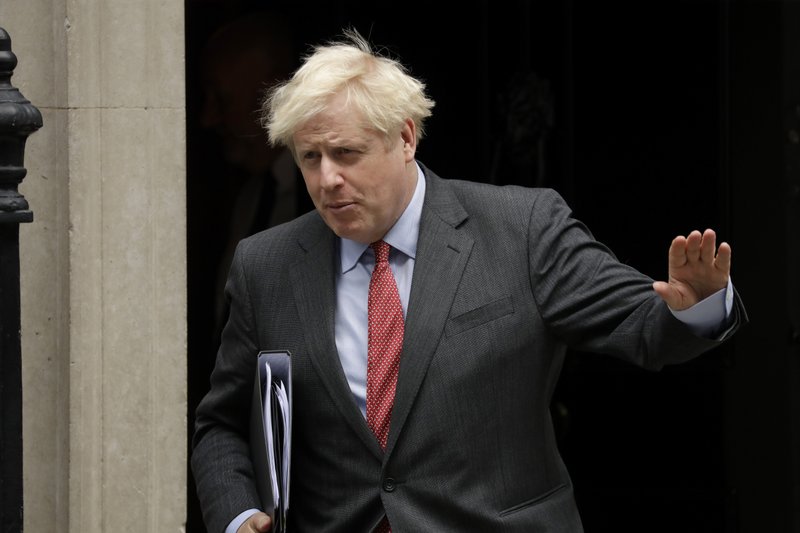British Prime Minister Boris Johnson appealed Tuesday for a “spirit of togetherness” as he unveiled a series of new restrictions on everyday life to suppress a dramatic spike in new coronavirus cases.
Warning that the restrictions, which will come into effect by the start of next week, could last for six months through the winter and into the spring, Johnson said pubs, restaurants and other entertainment venues in England will have to close at 10 p.m.
He also said stiff fines will be imposed on anyone breaking quarantine rules or gathering in groups of more than six. Johnson also changed course and urged people to work from home where possible.
He said the change of tack was necessary in light of a recent uptick in cases and implored people to follow the new rules to avert a further total lockdown, which would lead to the closure of schools and businesses and leave the elderly and vulnerable isolated.
“If we follow these simple rules together, we will get through this winter together,” he said. “But now is the time for us all to summon the discipline, and the resolve, and the spirit of togetherness that will carry us through.”
In a speech with deliberate echoes of World War II appeals to communal spirit, Johnson said that “never in our history has our collective destiny and our collective health depended so completely on our individual behavior.”
The other nations of the U.K. — Scotland, Wales and Northern Ireland — also tightened restrictions.
The new curbs came as official figures showed that the U.K. recorded 4,926 new coronavirus cases, the most since early May.
Though more testing is taking place now, the number of daily cases being reported is more than four times the figure of a month ago
Many scientists see echoes of the path of the outbreak earlier in the year when the virus spread through across the country and led to Europe’s deadliest outbreak. The U.K. has seen 41,825 people die within 28 days of testing positive for COVID-19.
While warning that life will not be getting back to normal anytime soon, and it seems certainly not for Christmas, Johnson laid out hope that a vaccine and widespread testing will turn things around.
He told lawmakers earlier in the House of Commons that barring a vaccine or new forms of mass testing, “we should assume that the restrictions I have announced will remain in place for perhaps six months.”
Johnson’s government has faced a barrage of criticism in recent weeks over its handling of the pandemic, especially over its perceived mixed messaging and sudden lurches in policy. It was only in August that it was encouraging people to go and help out pubs and restaurants via a discount scheme.
Just weeks ago, Johnson had also encouraged workers to go back into offices to keep city centers from becoming ghost towns, and had expressed hope that society could return to normal by Christmas.
The prime minister told lawmakers that if the new curbs did not slow the outbreak, “we reserve the right to deploy greater firepower, with significantly greater restrictions.”
Some scientists think that it’s inevitable that further restrictions will have be imposed for England.
Dr. David Strain, a senior clinical lecturer at the University of Exeter, said the government has acknowledged that the majority of transmission is happening socially, but said it should have done more on limiting social gatherings. At present, six people from six different households can meet.
“Closing down restaurants and pubs earlier will do little to stave the spread for as long as multiple different households can interchangeably meet up,” he said.
Scotland is going further than the restrictions that Johnson announced for England. Scottish First Minister Nicola Sturgeon, who has often struck a more cautious note than Johnson during the pandemic, said that with a few exceptions people would be barred from visiting others’ homes and car-sharing would be discouraged.
Sturgeon said the measures would be reviewed every three weeks but “may be needed for longer than that.” She said she hoped it would be less than six months.
Still, some lawmakers from Johnson’s governing Conservative Party were uneasy about tightening restrictions on business and daily life, citing civil liberties and the impact on Britain’s already-reeling economy.
Businesses, especially in the hospitality, sports and arts sectors, said they urgently needed support, too. Kate Nicholls, chief executive of trade body UKHospitality, said before the announcement that the restrictions would be “another crushing blow” for many businesses.
Carolyn Fairbairn, director-general of the Confederation of British Industry, said telling people to work from home was necessary but “comes at a serious price.” She urged the government to introduce new financial support for businesses in hard-hit city centers and for furloughed workers.
Amid concerns that some people who test positive for the virus are still going to work because they can’t afford to stay home, the government announced it would pay low-income workers 500 pounds ($639) if they are told to self-isolate for 14 days.
Jennifer Cole, a biological anthropologist at Royal Holloway University, said people’s behavior is “the biggest influence” on the spread of the virus.
“In essence, the government is saying, ‘Stay sober, stay sensible and the venues can stay open.’ It’s a carrot to encourage responsible behavior,” she said.
(AP)












One Response
So long as Johnson gets his Terms to Brexit exit by December 31, 2020 [so as not to need a Hard exit], the Corona issue is only secondary to him.